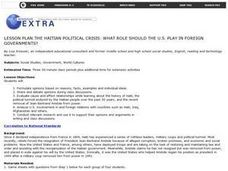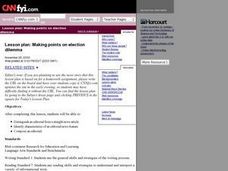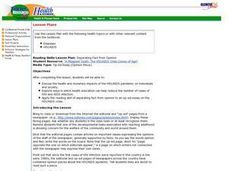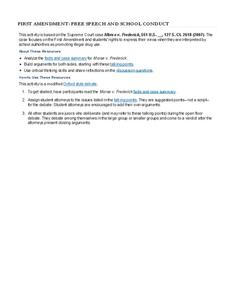San Antonio Independent School District
Breaking Down the Declaration of Independence
Are learners heavy sighing at the idea of reading a primary source, written in a language that is difficult to understand and in cursive? Look no further, because the resource breaks down the Declaration of Independence in an...
Personal Genetics Education Project
Genetics and Reproduction
Disease prevention or designer babies? Use a set of slides to introduce the growing practice of preimplantation genetic diagnosis, or PGD. Teens read related articles and then break into groups to address different scenarios. Afterward,...
Curated OER
Reading Comprehension Worksheet
In this reading comprehension worksheet, students read and answers questions. Students read a short passage and answer five questions about what they just read.
Curated OER
Trap Door Reading: Persuasive Text
Young scholars create T-charts to analyze persuasive text. In this persuasive text instructional activity students make predictions based upon titles and learn how to make arguments based on facts.
Curated OER
Good News/Bad News/Who Cares?
Students practice evaluating facts, bringing to bear their own experience, preferences, and international contexts. They recognize that there are many ways of interpreting a single piece of information and form the habit of reflecting...
iCivics
Yeah, But...
Impress upon your young learners the importance of formulating counter arguments based on facts and not opinions. This resource is meant to strengthen arguments designed in a previous lesson, but could also be used as a stand-alone...
Bantam Books
The Tempest: Chalk Talk
Discussion doesn't always need to be spoken. Before you begin The Tempest by William Shakespeare, have kids connect their ideas and experiences to central questions of the play with a silent discussion activity. Once they have...
Curated OER
The Haitian Political Crisis: What Role Should the U.S. Play in Foreign Governments?
Students examine the political situation in Haiti. They share their opinions on the role the United States should play in foreign governments. They identify the causes of the turmoil in the country as well.
Curated OER
Identifying the Theme in a Story
Students recognize Theme through the use of simple, short stories. Using Pro Quest, students begin by researching the literary element, theme, and how it can be identified. They then identify the themes in Aesop's Fables and other short...
PBS
The Big Picture-Economic Security in the Country and your Community
High schoolers explore economic security at the local and national level during the time period preceding the 2008 presidential election. They fill out surveys on their thoughts and concerns regarding the US economy, and watch a video...
Curated OER
Making Points on Election Dilemma
Students define a straight news article, and identify characteristics of an editorial news feature. They read a CNN article that examines the 2000 presidential election, and determine what is factual and what is opinion.
Beyond Benign
Medical Ethics
Just because we have the ability to determine an organism's traits through genetic testing, should we do it? Middle-school medical experts examine the ethical dilemmas in biotechnology in the 18th and final installment in a series of...
Curated OER
"The Story of Ruby Bridges"
Third graders examine the role of Ruby Bridges in the U.S. Civil Rights Movement. They listen to the teacher read the book "The Story of Ruby Bridges" by Robert Coles, identify what is fact or opinion in the story, and sequence events in...
Curated OER
Separating Fact from Opinion
Students read, "A Misspent youth: The HIV/AIDS Crisis Comes of Age", and discuss the article or write their answers to the questions imbedded in the lesson. They write their own essay.
Curated OER
Social Studies Strategies: Opinion Proof
In this strategy worksheet, students read about opinions and their proof, then use a "column note" graphic organizer to write an opinion on the left, and the support, or proof of the opinion on the left.
Curated OER
Nonfiction Genre Mini-Unit: Persuasive Writing
Should primary graders have their own computers? Should animals be kept in captivity? Young writers learn how to develop and support a claim in this short unit on persuasive writing.
EngageNY
TASC Transition Curriculum: Workshop 12
How can opinions slant facts? Workshop participants learn how to examine primary and secondary sources and identify the author's point of view. They also examine how visual art impacts the meaning and rhetoric of sources. Full of...
Crafting Freedom
Thomas Day's Letter to His Daughter, Mary Ann
Why is a letter a better way to learn about a person than a different primary source? Explore Thomas Day's ideas and advice to his daughter in a letter from 1851, which details the struggles of the American South before the Civil War....
EngageNY
Editing Sentences and Creating Visual and Multimedia Displays for a Presentation
Let's get visual. Pupils plan visual displays to accompany their upcoming opinion speech presentations. Additionally, they practice editing sentences for clarity before revising their speech drafts.
State Bar of Texas
Wisconsin v. Yoder
How far does freedom of religion truly go? The 1972 Supreme Court case Wisconsin v. Yoder introduces the concept of the free exercise clause of the First Amendment. Individuals examine the case with a short video and open discussion. To...
State Bar of Texas
Baker v. Carr
Can the federal government override the state government to protect the citizens of the United States? The 1962 Supreme Court case Baker v. Carr outlines the issue of equal protection under the law. Scholars investigate with a short...
State Bar of Texas
Engel v. Vitale
Can you bow your head and pray in school? Scholars investigate the issue of school prayer with the Supreme Court case Engel v. Vitale. A short video clip along with paired group work helps viewers form opinions on the matter. They answer...
State Bar of Texas
Brown v. Board of Education
You walk each day over 20 blocks to school as a 9-year old because the color of your skin does not allow you to attend a school in your own neighborhood. Scholars use the 1954 Supreme Court case Brown v. Board of Education to investigate...
Administrative Office of the US Courts
Morse v. Frederick
If you stop a student from expressing views that advocate drug use, are you violating their right to free speech? Use the 2007 Supreme Court case Morse v. Frederick to discuss a nuanced interpretation of the First Amendment. Learners...

























